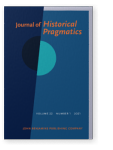Vol. 22:1 (2021) ► pp.69–95
Systemic change and interactional motivation
The development of the Chinese sentence-final particle bucheng
The paper focusses on the language-internal and -external motivations for the development of Chinese sentence-final particle bucheng. This particle, from an initial state as a negative verb string, developed into a sentence-final particle through intermediate adverbial stages, and was recruited to interpersonal functions in final position by the sixteenth century. Key motivating factors are identified for the expansion of its functional range, with particular attention to the development of the Written Vernacular in Early Modern Chinese and to interactional echoic contexts that contribute to the right-ward movement and thence the rise of the particle. Exploration of the diachronic development of bucheng not only expands the known inventory of morphosyntactic processes and linguistic contexts that give rise to pragmatic devices clause-finally but also yields a better understanding of the right-ward movement of lexemes towards clause-/utterance-final position.
Article outline
- 1.Introduction
- 2.Background
- 3.Data and methodology
- 4.Synchronic functions
- 5.Historical development
- 6.In search of an account of the rise of sentence-final bucheng
- 7.Conclusion
- Notes
- Abbreviations
-
References
